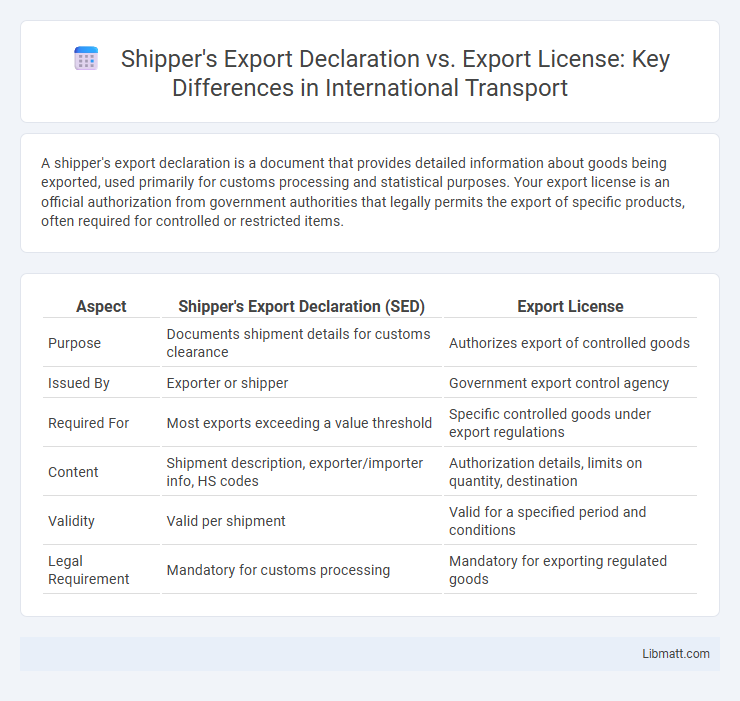A shipper's export declaration is a document that provides detailed information about goods being exported, used primarily for customs processing and statistical purposes. Your export license is an official authorization from government authorities that legally permits the export of specific products, often required for controlled or restricted items.
Table of Comparison
| Aspect | Shipper's Export Declaration (SED) | Export License |
|---|---|---|
| Purpose | Documents shipment details for customs clearance | Authorizes export of controlled goods |
| Issued By | Exporter or shipper | Government export control agency |
| Required For | Most exports exceeding a value threshold | Specific controlled goods under export regulations |
| Content | Shipment description, exporter/importer info, HS codes | Authorization details, limits on quantity, destination |
| Validity | Valid per shipment | Valid for a specified period and conditions |
| Legal Requirement | Mandatory for customs processing | Mandatory for exporting regulated goods |
Introduction to Shipper's Export Declaration and Export License
Shipper's Export Declaration (SED) is a U.S. Customs document required for exports valued over $2,500, providing detailed information about the shipment for statistical and regulatory purposes. An Export License, issued by government authorities such as the U.S. Department of Commerce, authorizes the legal export of specific goods subject to control due to national security, trade restrictions, or foreign policy concerns. While the SED facilitates export documentation and tracking, the Export License ensures compliance with export control laws.
Definition and Purpose of Shipper’s Export Declaration
A Shipper's Export Declaration (SED) is an official document required by the U.S. government for tracking and controlling exports, providing vital data on the shipment's contents, value, and destination. Its primary purpose is to facilitate compliance with export regulations, support trade statistics, and ensure national security. Your accurate completion of the SED helps customs officials monitor export activities and enforce trade laws effectively.
Definition and Purpose of Export License
An export license is an official government authorization permitting the shipment of specific goods to designated countries, ensuring compliance with national security and trade regulations. Unlike a shipper's export declaration, which primarily serves as a statistical report for customs, an export license controls and restricts trade based on the nature of the product, destination, or end-use. Your business must obtain an export license when dealing with regulated items to avoid legal penalties and facilitate smooth international transactions.
Key Differences Between Shipper's Export Declaration and Export License
The Shipper's Export Declaration (SED) is a government-required document that reports export details such as commodity, value, and destination for statistical and regulatory purposes. An Export License is an official authorization issued by the government permitting the export of specific goods, often restricted or controlled for national security or trade compliance. Your export process requires an SED for most shipments, while an Export License applies only to regulated products, ensuring legal compliance and avoiding shipment delays.
When is a Shipper's Export Declaration Required?
A Shipper's Export Declaration (SED) is required when exporting U.S.-origin goods valued over $2,500 or subject to export control regulations. The SED provides the U.S. Census Bureau and other agencies with critical export data for monitoring trade compliance and national security. Your shipment requires an export license instead if the goods fall under controlled categories specified by the Bureau of Industry and Security or other regulatory authorities.
When is an Export License Necessary?
An Export License is necessary when exporting controlled or restricted goods as specified by the destination country's regulations, such as military equipment, high-tech electronics, or certain chemicals. A Shipper's Export Declaration (SED) primarily serves to provide export data to customs authorities and is required for shipments exceeding specific value or destination criteria. Understanding when your shipment needs an Export License ensures compliance with international trade laws and prevents legal penalties.
Compliance and Legal Implications
Shipper's Export Declaration (SED) is a mandatory document required for U.S. exports to ensure compliance with customs regulations and accurate trade statistics, while an export license is a government authorization needed for controlled goods under export control laws. Failure to file an SED or obtain the appropriate export license can result in severe legal penalties, including fines, shipment delays, and potential criminal charges. Ensuring your shipment meets these compliance requirements protects your business from legal risks and facilitates smooth international trade operations.
Documentation Process and Workflow
The shipper's export declaration (SED) is a crucial document in the export documentation process, serving as the official record submitted to customs authorities detailing goods, values, and destination, thereby facilitating export control and compliance. In contrast, an export license is an authorization that permits the shipment of specific goods subject to government regulation, requiring prior approval before the export can proceed. Your export workflow involves first determining if your goods require a license, obtaining it if necessary, and then completing the SED to ensure accurate reporting and smooth customs clearance.
Common Mistakes and How to Avoid Them
Common mistakes in Shipper's Export Declarations (SED) include inaccurate commodity descriptions, incorrect Harmonized System (HS) codes, and missing consignee details, which can lead to shipment delays or fines. Export license errors often involve using the wrong license type, misunderstanding license conditions, or failing to secure a license when required, causing export restrictions violations. To avoid these issues, exporters should verify all data against official classifications, consult licensing authorities for specific product controls, and implement thorough compliance checks before submission.
Choosing the Right Export Documentation for Your Shipment
Selecting the appropriate export documentation such as a Shipper's Export Declaration (SED) or an export license depends on the shipment's destination, value, and regulatory requirements. The SED is primarily used for statistical data collection and must be filed for shipments exceeding specific thresholds, whereas an export license is a government-issued authorization required for controlled or restricted goods. Understanding the nature of your products and destination country regulations ensures compliance and smooth customs clearance, minimizing delays and penalties.
shipper's export declaration vs export license Infographic

 libmatt.com
libmatt.com